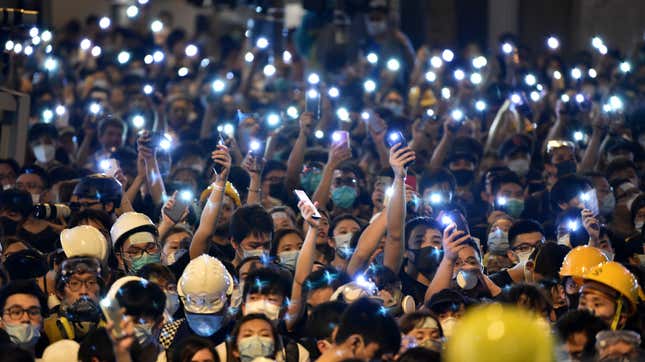
When Hong Kong passed its shiny new national security law last week, the city’s authorities were probably expecting a bit of pushback from the locals, who’ve called the new regime everything from “chilling” to “draconian” to nothing less than the Chinese Communist Party’s “takeover of Hong Kong.”
What they probably didn’t anticipate was resistance from some of the biggest tech players around. But as spokespeople from Google, Twitter, Facebook, and Facebook-owned Whatsapp told the Wall Street Journal, the companies have hit pause on accepting any user data requests from Hong Kong law enforcement agencies. Evidently, these companies, much like the United Nations, see the sweeping legislation as a potential abuse of human rights that they want to stay as far away from as possible.
In a statement, a Facebook spokesperson told the Journal, “We believe freedom of expression is a fundamental human right and support the right of people to express themselves without fear for their safety or other repercussions.” Whatsapp told the outlet it was “pausing” its cooperation “pending further assessment of the impact of the National Security Law, including formal human-rights due diligence and consultations with human-rights experts.”
Google and Twitter both told the Journal they had stopped turning over user data to Hong Kong authorities after the law went into effect on June 30.
The law vaguely criminalizes terrorism, subversion of the state, and collusion with a foreign power and carries sentences as harsh as life in prison, providing government authorities with sweeping powers to stamp out the pro-democracy protests that have been taking place in Hong Kong for more than a year.
Regardless of whether the Silicon Valley stand is just a grab at some good press all of the tech giants, particularly Facebook, desperately need right now, it’s still a stand that makes Bejing’s dream of a turning Hong Kong into a full-on surveillance state that much harder to manifest, if only because of the platforms involved. Over the past year, Twitter has become the app of choice among Hong Kong’s protestors, even as the app’s popularity lags behind apps used in mainland China. Meanwhile, Facebook and Whatsapp are among Hong Kong’s most popular apps in general, with the city boasting more than 4 million Facebook die-hards across the city.
Anyone protesting on the streets of Hong Kong will probably have something of a footprint on all three of these platforms, and under the way the new mandates are currently written, law enforcement officials in the city should have the right to erase portions of that footprint if they suspect that they are a “national security” risk, in addition to requesting private data about targeted users. The publishers and platforms that don’t comply with the law could face a hefty fine and potential time in prison.
That said, Facebook, Twitter and Google are no strangers to forking over citizen data to the local authorities that ask for it. As the Journal details, the latter half of 2019 saw Hong Kong authorities hit Facebook with more than 240 requests for data on users in Hong Kong, and the company drudged up that data for just under half of those requests.
It’s also worth pointing out that this stance these companies are taking isn’t just one that’s good for human rights—it’s also good for business. Since Bejing passed these regulations last week, citizens that are particularly fearful of the new authoritarian power have been quietly scrubbing their presence off these platforms, if not abandoning them entirely. Taking a pro-protester stand could keep these platforms from bleeding users in what’s generally agreed to be a hyper-connected and hyper-profitable market.
Even if they’re taking the high road for profit or free press, this might be one of those cases where the ends justify the means—at least as far as human rights are concerned.